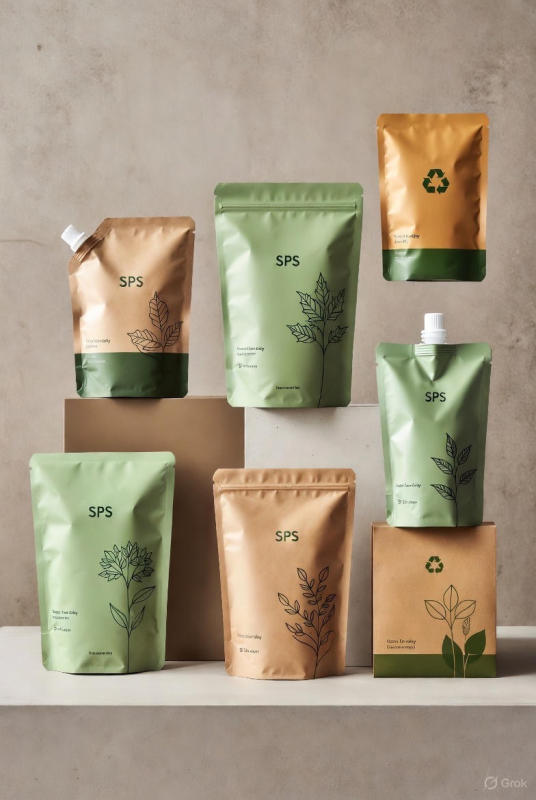As sustainability continues to be a hot-topic, businesses and consumers alike are increasingly searching for eco-friendly packaging options. Pouches have gained popularity across industries due to their lightweight and flexible design, but how do they truly compare to traditional packaging formats like glass jars, steel cans, or high-density polyethylene (HDPE) bottles when it comes to eco-friendliness? This blog explores the environmental impact of pouches based on findings from recent Life Cycle Assessment (LCA) studies, helping you make informed, sustainable choices.

The environmental footprint of packaging spans its entire lifecycle—from raw material extraction and manufacturing to transportation, usage, and end-of-life disposal or recycling. Life Cycle Assessments evaluate these impacts across key indicators, such as climate change, acidification, and energy consumption, to measure the sustainability of different packaging formats.
Recent LCAs, including one by the ifeu Institute in 2021, examined pouches in comparison to glass jars and steel cans for food products. The results show that pouches generally have a lower environmental impact across key categories, largely due to their material efficiency and lighter weight, which reduce resource consumption and emissions.
Pouches used for food products showed a 63% reduction in climate change impact compared to glass jars and a 69% reduction compared to steel cans. However, the use of heavier secondary packaging for pouches, such as corrugated cardboard, can contribute to impacts like aquatic eutrophication, particularly in water ecosystems, due to nutrient releases associated with cardboard production.
Another LCA assessed pouches versus HDPE bottles for enteral nutrition products. The results favour pouches in terms of greenhouse gas emissions across various markets, as pouches emitted 237 kg CO2e per 1000 liters compared to 295-351 kg CO2e for HDPE bottles. Despite the high recyclability of HDPE, pouches emerged with a lower overall environmental impact due to reduced materials and emissions.
Material Efficiency: they require significantly less material to produce when compared to rigid packaging options, such as glass and metal. Studies, like those by the Flexible Packaging Association, show that they can use 26-80% less material than rigid containers for the same volume, reducing waste.
Transportation Efficiency: They are lightweight and compact, leading to lower transportation emissions. Reports from Smithers Pira and the Environmental Paper Network highlight how flexible packaging formats such as pouches can reduce fuel consumption by up to 60% compared to glass and metal.
Waste Reduction: With reduced material use and weight, they generate less waste in production and disposal. The Ellen MacArthur Foundation and UNEP have noted the potential of flexible packaging in waste minimisation, particularly when designed with recyclability in mind.
Extended Shelf Life: Multilayer formats offer advanced barrier properties, which can help extend the shelf life of products, reducing food waste. Studies in the International Journal of Food Science & Technology and Food Packaging and Shelf Life confirm these benefits.
A challenge with flexible packaging is the limited recyclability of multilayer flexible plastics at scale. Ongoing innovations in packaging materials are addressing this though, with innovations in recyclable and compostable packaging becoming more accessible for smaller businesses. Bio-based plastics and mono-material pouches are also emerging, which would make flexible packaging more sustainable and compatible with a circular economy.
Based on recent studies, pouches are a highly eco-friendly alternative to traditional formats like glass jars, steel cans, and HDPE bottles. Their material and transportation efficiency make them a compelling option for companies looking for sustainable packaging.
For businesses aiming to reduce their environmental footprint, switching to pouch packaging could be a significant step forward. As consumer demand for sustainable packaging grows, adopting eco-friendly packaging like pouches is not only environmentally beneficial but also aligns with market trends for a greener future.
References:
• ifeu Study on Pouches vs. Traditional Packaging (2021)
• Life Cycle Assessment of Packaging Systems for Enteral Nutrition (2021)
• Flexible Packaging Association Reports
• Ellen MacArthur Foundation Report on Plastics Economy
• United Nations Environment Programme Report on Sustainable Packaging
If you have any enquiries concerning our pouch packaging, or would simply like to get in touch with our team, you can use the contact form or details below.